英语语法总结[大学]
- 格式:doc
- 大小:250.00 KB
- 文档页数:34
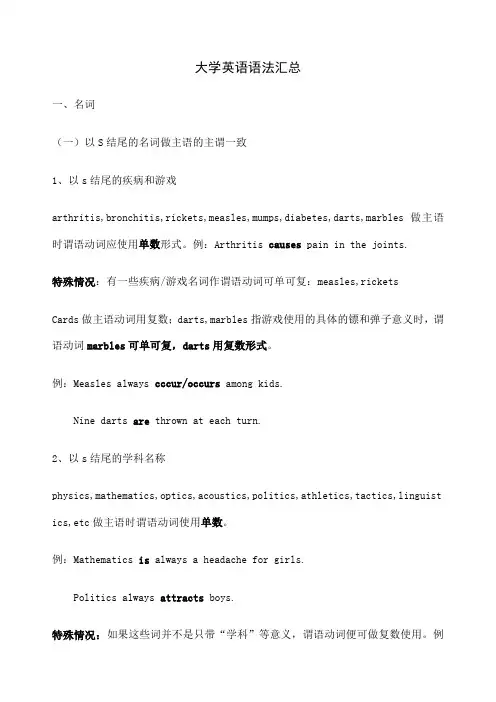
大学英语语法汇总一、名词(一)以S结尾的名词做主语的主谓一致1、以s结尾的疾病和游戏arthritis,bronchitis,rickets,measles,mumps,diabetes,darts,marbles做主语时谓语动词应使用单数形式。
例:Arthritis causes pain in the joints.特殊情况:有一些疾病/游戏名词作谓语动词可单可复:measles,ricketsCards做主语动词用复数;darts,marbles指游戏使用的具体的镖和弹子意义时,谓语动词marbles可单可复,darts用复数形式。
例:Measles always cccur/occurs among kids.Nine darts are thrown at each turn.2、以s结尾的学科名称physics,mathematics,optics,acoustics,politics,athletics,tactics,linguist ics,etc做主语时谓语动词使用单数。
例:Mathematics is always a headache for girls.Politics always attracts boys.特殊情况:如果这些词并不是只带“学科”等意义,谓语动词便可做复数使用。
例如,mathematics运算能力,athletic体育运动,acoustics音响效果,tactics策略,economics经济学意义。
例:The acoustics in Bon Jovi’s Tulsa concert were beyond criticism last spring.3、以s结尾的地理名称The States,the united states,the Netherlands,the Philippines,the United Arab Emirates,the United Nation做主语时,谓语动词使用单数。
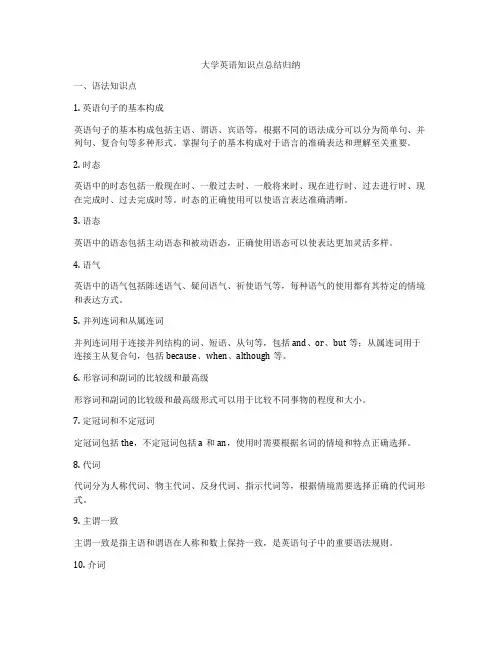
大学英语知识点总结归纳一、语法知识点1. 英语句子的基本构成英语句子的基本构成包括主语、谓语、宾语等,根据不同的语法成分可以分为简单句、并列句、复合句等多种形式。
掌握句子的基本构成对于语言的准确表达和理解至关重要。
2. 时态英语中的时态包括一般现在时、一般过去时、一般将来时、现在进行时、过去进行时、现在完成时、过去完成时等。
时态的正确使用可以使语言表达准确清晰。
3. 语态英语中的语态包括主动语态和被动语态,正确使用语态可以使表达更加灵活多样。
4. 语气英语中的语气包括陈述语气、疑问语气、祈使语气等,每种语气的使用都有其特定的情境和表达方式。
5. 并列连词和从属连词并列连词用于连接并列结构的词、短语、从句等,包括and、or、but等;从属连词用于连接主从复合句,包括because、when、although等。
6. 形容词和副词的比较级和最高级形容词和副词的比较级和最高级形式可以用于比较不同事物的程度和大小。
7. 定冠词和不定冠词定冠词包括the,不定冠词包括a和an,使用时需要根据名词的情境和特点正确选择。
8. 代词代词分为人称代词、物主代词、反身代词、指示代词等,根据情境需要选择正确的代词形式。
9. 主谓一致主谓一致是指主语和谓语在人称和数上保持一致,是英语句子中的重要语法规则。
10. 介词介词用于连接名词、代词、动词或形容词等,构成介词短语用于修饰其他成分,掌握介词的使用可以使语言表达更加丰富。
二、词汇知识点1. 单词的拼写和发音掌握英语单词的拼写和发音是学习英语的基本功,有助于提高语言表达的准确性。
2. 同义词和反义词同义词和反义词可以丰富语言表达的方式,帮助学习者避免重复使用相同的词汇。
3. 词汇搭配词汇搭配是指在语言表达中,词语之间常常有固定的搭配关系,如动词搭配介词、名词搭配形容词等,掌握词汇搭配可以使表达更加自然流畅。
4. 词义辨析英语中存在大量近义词和异义词,学习者需要掌握它们的区别和正确用法,避免混淆。
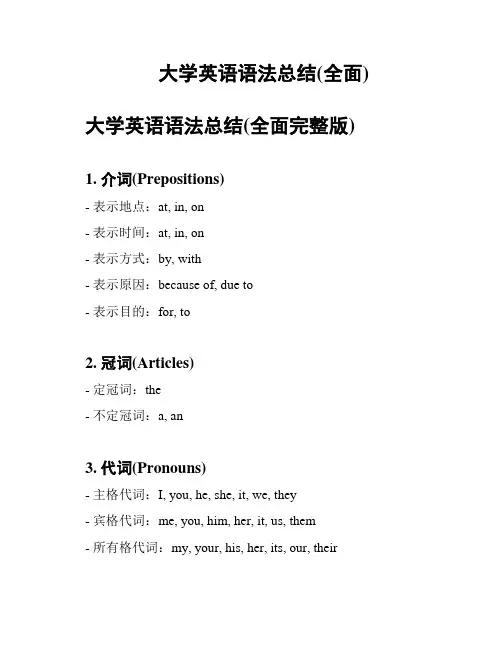
大学英语语法总结(全面)大学英语语法总结(全面完整版)1. 介词(Prepositions)- 表示地点:at, in, on- 表示时间:at, in, on- 表示方式:by, with- 表示原因:because of, due to- 表示目的:for, to2. 冠词(Articles)- 定冠词:the- 不定冠词:a, an3. 代词(Pronouns)- 主格代词:I, you, he, she, it, we, they- 宾格代词:me, you, him, her, it, us, them- 所有格代词:my, your, his, her, its, our, their- 反身代词:myself, yourself, himself, herself, itself, ourselves, themselves4. 名词(Nouns)- 单数名词:book, chair, dog- 复数名词:books, chairs, dogs- 不可数名词:water, money, information5. 动词(Verbs)- 一般现在时:I walk, you walk, he/she/it walks, we walk, they walk- 一般过去时:I walked, you walked, he/she/it walked, we walked, they walked- 现在进行时:I am walking, you are walking, he/she/it is walking, we are walking, they are walking- 过去进行时:I was walking, you were walking, he/she/it was walking, we were walking, they were walking- 一般将来时:I will walk, you will walk, he/she/it will walk, we will walk, they will walk6. 形容词(Adjectives)- 描述名词特征:big, small, tall- 比较级:bigger, smaller, taller- 最高级:biggest, smallest, tallest7. 副词(Adverbs)- 表示方式:quickly, slowly- 表示程度:very, extremely- 表示时间:now, yesterday8. 连词(Conjunctions)- 表并列:and, or- 表递进:furthermore, moreover- 表转折:however, but- 表原因:because, since以上是大学英语语法的简要总结,希望对你有帮助。
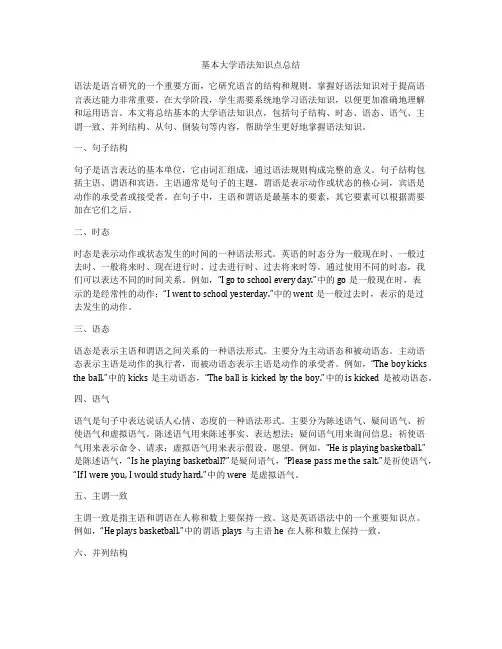
基本大学语法知识点总结语法是语言研究的一个重要方面,它研究语言的结构和规则。
掌握好语法知识对于提高语言表达能力非常重要。
在大学阶段,学生需要系统地学习语法知识,以便更加准确地理解和运用语言。
本文将总结基本的大学语法知识点,包括句子结构、时态、语态、语气、主谓一致、并列结构、从句、倒装句等内容,帮助学生更好地掌握语法知识。
一、句子结构句子是语言表达的基本单位,它由词汇组成,通过语法规则构成完整的意义。
句子结构包括主语、谓语和宾语。
主语通常是句子的主题,谓语是表示动作或状态的核心词,宾语是动作的承受者或接受者。
在句子中,主语和谓语是最基本的要素,其它要素可以根据需要加在它们之后。
二、时态时态是表示动作或状态发生的时间的一种语法形式。
英语的时态分为一般现在时、一般过去时、一般将来时、现在进行时、过去进行时、过去将来时等。
通过使用不同的时态,我们可以表达不同的时间关系。
例如,“I go to school every day.”中的go是一般现在时,表示的是经常性的动作;“I went to school yesterday.”中的went是一般过去时,表示的是过去发生的动作。
三、语态语态是表示主语和谓语之间关系的一种语法形式。
主要分为主动语态和被动语态。
主动语态表示主语是动作的执行者,而被动语态表示主语是动作的承受者。
例如,“The boy kicks the ball.”中的kicks是主动语态,“The ball is kicked by the boy.”中的is kicked是被动语态。
四、语气语气是句子中表达说话人心情、态度的一种语法形式。
主要分为陈述语气、疑问语气、祈使语气和虚拟语气。
陈述语气用来陈述事实、表达想法;疑问语气用来询问信息;祈使语气用来表示命令、请求;虚拟语气用来表示假设、愿望。
例如,“He is playing basketball.”是陈述语气,“Is he playing basketball?”是疑问语气,“Please pass me the salt.”是祈使语气,“If I were you, I would study hard.”中的were是虚拟语气。
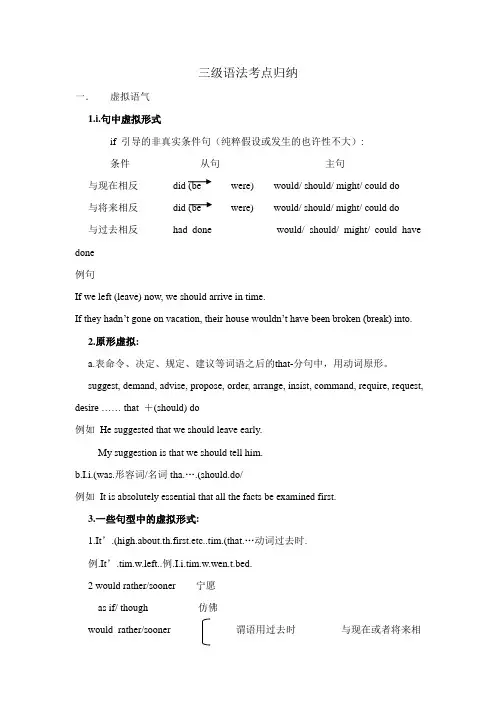
三级语法考点归纳一.虚拟语气1.i.句中虚拟形式if 引导的非真实条件句(纯粹假设或发生的也许性不大):条件从句主句与现在相反did (be were) would/ should/ might/ could do与将来相反did (be were) would/ should/ might/ could do与过去相反had done would/ should/ might/ could have done例句If we left (leave) now, we should arrive in time.If they hadn’t gone on vacation, their house wouldn’t have been broken (break) into.2.原形虚拟:a.表命令、决定、规定、建议等词语之后的that-分句中,用动词原形。
suggest, demand, advise, propose, order, arrange, insist, command, require, request, desire …… that +(should) do例如He suggested that we should leave early.My suggestion is that we should tell him.b.I.i.(was.形容词/名词tha.….(should.do/例如It is absolutely essential that all the facts be examined first.3.一些句型中的虚拟形式:1.It’.(high.about.th.first.etc..tim.(that.…动词过去时.例.It’.tim.w.left..例.I.i.tim.w.wen.t.bed.2 would rather/sooner 宁愿as if/ though 仿佛would rather/sooner 谓语用过去时与现在或者将来相反as if/ though 谓语用过去完毕时与过去相反4.练习1..______.tr.i.agai.i.I_______you.A.will.a......B.should.a....C.would.wer...D.would.ha.been2.I.i.______.no.fo.th.water.th.plant._______live.A.were.woul.no..B.is.coul.no...C.were.coul...D.did.coul.not3.I.. ______.tha.chanc.t.sho.m.ability.._______th.presiden.o.thi.school.A.hav.no.had.coul.no.become ..B.ha.no.had.woul.no.hav.becom.C.di.no.have.coul.no.become ..D.doesn’.have.wil.no.become4.H.______.b.tha.burgla.i.yo.______.t.sav.him.A.migh.hav.bee.killed.hadn’.com...B.wil.b.killed.didn’.comeC.ma.b.killed.did’.com.......D.coul.b.killed.haven’.come5.I.i._______fo.you.help.._______tha.har.tim.wit.s.littl.money.A.wer.not.woul.no.spen........B.i.not.ca.no.spendC.ha.no.been.woul.no.hav.spen....D.hav.no.been.wil.no.spend6.Wher.______.yo.g.i.wa._______?A.will.break.ou............B.do.wil.brea.outC.would.wer.t.brea.ou........D.will.i.t.brea.out7.Sh.wishe.sh.______.tha.humiliatin.thing.A.doesn’.d....B.didn’.d.....C.haven’.don..D.hadn’.done8.Th.chairma.suggeste.tha.th.meetin.______.pu.off.A.ca.b.....B.b......C.i.......D.wil.be9.I.i.vita.tha.h.______.immediately.A.shoul.g...B.mus.g....C.goe......D.wen.10.I.i.tim.w._______d.ou.homework.A.begi.t....B.ca.begi.t..C.bega.t....D.wil.begi.to答案:1.选C。
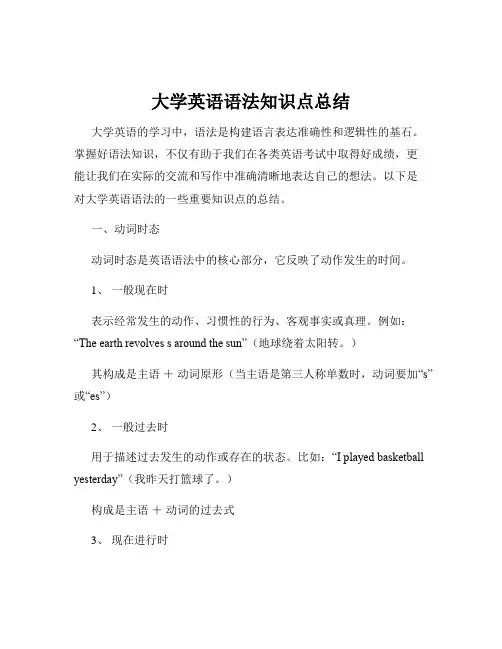
大学英语语法知识点总结大学英语的学习中,语法是构建语言表达准确性和逻辑性的基石。
掌握好语法知识,不仅有助于我们在各类英语考试中取得好成绩,更能让我们在实际的交流和写作中准确清晰地表达自己的想法。
以下是对大学英语语法的一些重要知识点的总结。
一、动词时态动词时态是英语语法中的核心部分,它反映了动作发生的时间。
1、一般现在时表示经常发生的动作、习惯性的行为、客观事实或真理。
例如:“The earth revolves s around the sun”(地球绕着太阳转。
)其构成是主语+动词原形(当主语是第三人称单数时,动词要加“s”或“es”)2、一般过去时用于描述过去发生的动作或存在的状态。
比如:“I played basketball yesterday”(我昨天打篮球了。
)构成是主语+动词的过去式3、现在进行时表示正在进行的动作。
像:“He is reading a book now”(他正在读书。
)结构为:主语+ be 动词(am/is/are)+动词的现在分词4、过去进行时强调过去某个时刻正在进行的动作。
例如:“I was doing myho mework at 8 o'clock last night”(昨晚八点我正在做作业。
)其形式为:主语+ was/were +动词的现在分词5、现在完成时表示过去发生的动作对现在造成的影响或结果,或者过去的动作一直持续到现在。
例如:“I have finished my work”(我已经完成了工作。
)由“主语+ have/has +动词的过去分词”构成6、过去完成时表示过去某一时间或动作之前已经发生或完成的动作。
例如:“By the end of last year, I had learned 5000 words”(到去年年底,我已经学了5000 个单词。
)结构为:主语+ had +动词的过去分词7、一般将来时用以表达将来要发生的动作或存在的状态。
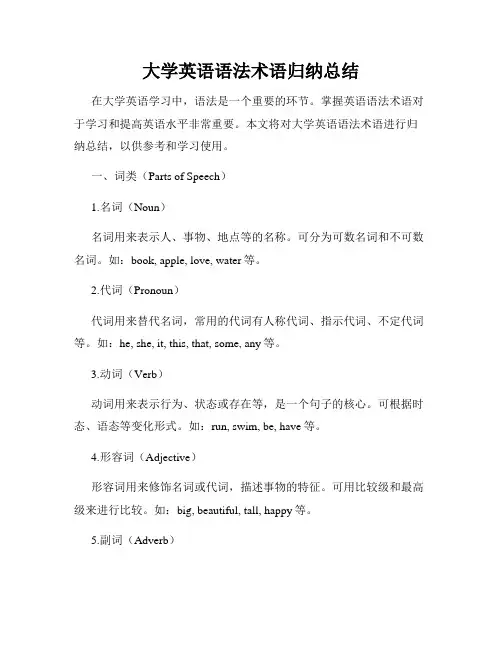
大学英语语法术语归纳总结在大学英语学习中,语法是一个重要的环节。
掌握英语语法术语对于学习和提高英语水平非常重要。
本文将对大学英语语法术语进行归纳总结,以供参考和学习使用。
一、词类(Parts of Speech)1.名词(Noun)名词用来表示人、事物、地点等的名称。
可分为可数名词和不可数名词。
如:book, apple, love, water等。
2.代词(Pronoun)代词用来替代名词,常用的代词有人称代词、指示代词、不定代词等。
如:he, she, it, this, that, some, any等。
3.动词(Verb)动词用来表示行为、状态或存在等,是一个句子的核心。
可根据时态、语态等变化形式。
如:run, swim, be, have等。
4.形容词(Adjective)形容词用来修饰名词或代词,描述事物的特征。
可用比较级和最高级来进行比较。
如:big, beautiful, tall, happy等。
5.副词(Adverb)副词用来修饰动词、形容词、其他副词等,用于描述行为方式、程度、时间等。
如:quickly, very, soon, often等。
6.介词(Preposition)介词用来表达位置、方向、时间、原因等关系,常与名词或代词搭配使用。
如:in, on, at, for, with等。
7.连词(Conjunction)连词用来连接词语、短语、从句等,使句子结构更加完整。
如:and, but, or, because等。
8.感叹词(Interjection)感叹词用来表达强烈的情感或意见,常用于口语交流中。
如:oh, wow, yes, no等。
二、句子成分(Sentence Elements)1.主语(Subject)主语是一个句子中的核心,通常是一个名词或代词。
如:I, he, the dog, my sister等。
2.谓语(Predicate)谓语是一个句子中的动词或动词短语,用来描述主语的动作或状态。
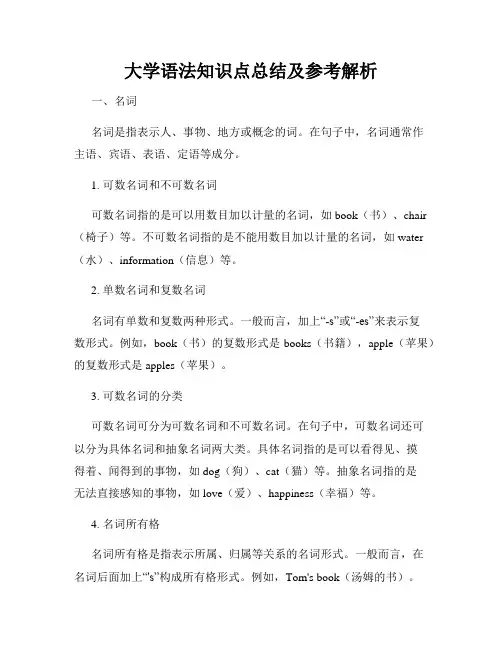
大学语法知识点总结及参考解析一、名词名词是指表示人、事物、地方或概念的词。
在句子中,名词通常作主语、宾语、表语、定语等成分。
1. 可数名词和不可数名词可数名词指的是可以用数目加以计量的名词,如book(书)、chair (椅子)等。
不可数名词指的是不能用数目加以计量的名词,如water (水)、information(信息)等。
2. 单数名词和复数名词名词有单数和复数两种形式。
一般而言,加上“-s”或“-es”来表示复数形式。
例如,book(书)的复数形式是books(书籍),apple(苹果)的复数形式是apples(苹果)。
3. 可数名词的分类可数名词可分为可数名词和不可数名词。
在句子中,可数名词还可以分为具体名词和抽象名词两大类。
具体名词指的是可以看得见、摸得着、闻得到的事物,如dog(狗)、cat(猫)等。
抽象名词指的是无法直接感知的事物,如love(爱)、happiness(幸福)等。
4. 名词所有格名词所有格是指表示所属、归属等关系的名词形式。
一般而言,在名词后面加上“'s”构成所有格形式。
例如,Tom's book(汤姆的书)。
二、代词代词是指用来代替名词或名词词组的词。
在句子中,代词可以作为名词的替代,起到简化和化用句子的作用。
1. 人称代词人称代词是指用来代替人或事物的代词。
在英语中,一般有第一人称(I、we)、第二人称(you)和第三人称(he、she、it、they)三种人称代词形式。
2. 物主代词物主代词是指表示所有关系的代词。
一般而言,物主代词可分为主格和宾格两种形式。
例如,在主格中,my(我的)、your(你的)、his(他的)等;在宾格中,mine(我的)、yours(你的)、hers(她的)等。
3. 反身代词反身代词是指表示动作反射到主体身上的代词。
例如,myself(我自己)、yourself(你自己)、himself(他自己)等。
4. 指示代词指示代词是指用来指示人或事物的代词。
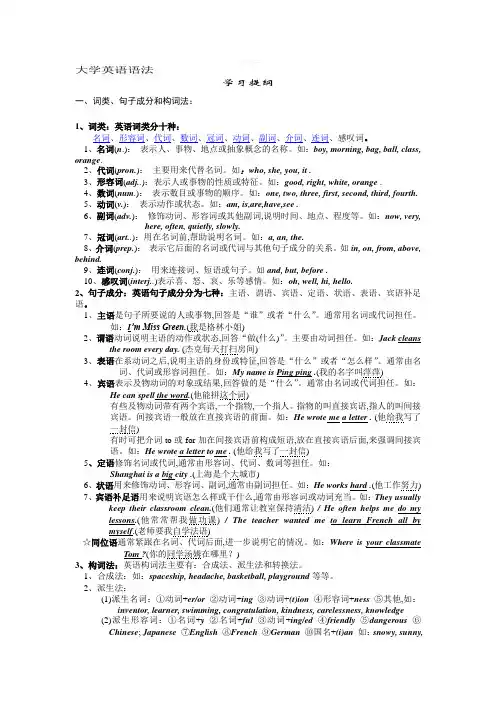
大学英语语法学习提纲一、词类、句子成分和构词法:1、词类:英语词类分十种:名词、形容词、代词、数词、冠词、动词、副词、介词、连词、感叹词。
1、名词(n.):表示人、事物、地点或抽象概念的名称。
如:boy, morning, bag, ball, class, orange.2、代词(pron.):主要用来代替名词。
如:who, she, you, it .3、形容词(adj..):表示人或事物的性质或特征。
如:good, right, white, orange .4、数词(num.):表示数目或事物的顺序。
如:one, two, three, first, second, third, fourth.5、动词(v.):表示动作或状态。
如:am, is,are,have,see .6、副词(adv.):修饰动词、形容词或其他副词,说明时间、地点、程度等。
如:now, very,here, often, quietly, slowly.7、冠词(art..):用在名词前,帮助说明名词。
如:a, an, the.8、介词(prep.):表示它后面的名词或代词与其他句子成分的关系。
如in, on, from, above, behind.9、连词(conj.):用来连接词、短语或句子。
如and, but, before .10、感叹词(interj..)表示喜、怒、哀、乐等感情。
如:oh, well, hi, hello.2、句子成分:英语句子成分分为七种:主语、谓语、宾语、定语、状语、表语、宾语补足语。
1、主语是句子所要说的人或事物,回答是“谁”或者“什么”。
通常用名词或代词担任。
如:I’m Miss Green.(我是格林小姐)2、谓语动词说明主语的动作或状态,回答“做(什么)”。
主要由动词担任。
如:Jack cleansthe room every day. (杰克每天打扫房间)3、表语在系动词之后,说明主语的身份或特征,回答是“什么”或者“怎么样”。
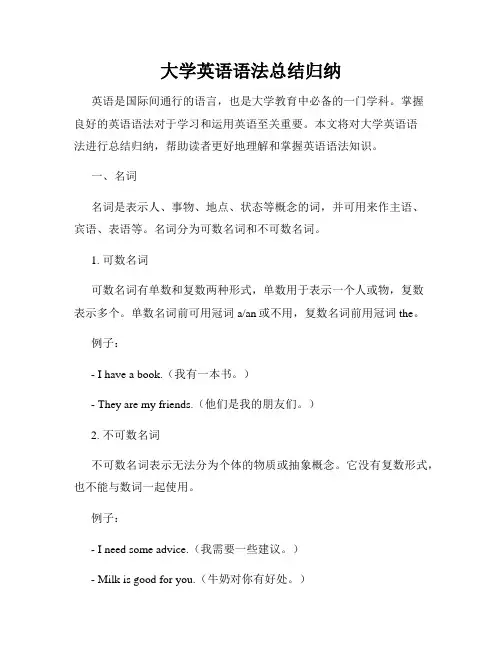
大学英语语法总结归纳英语是国际间通行的语言,也是大学教育中必备的一门学科。
掌握良好的英语语法对于学习和运用英语至关重要。
本文将对大学英语语法进行总结归纳,帮助读者更好地理解和掌握英语语法知识。
一、名词名词是表示人、事物、地点、状态等概念的词,并可用来作主语、宾语、表语等。
名词分为可数名词和不可数名词。
1. 可数名词可数名词有单数和复数两种形式,单数用于表示一个人或物,复数表示多个。
单数名词前可用冠词a/an或不用,复数名词前用冠词the。
例子:- I have a book.(我有一本书。
)- They are my friends.(他们是我的朋友们。
)2. 不可数名词不可数名词表示无法分为个体的物质或抽象概念。
它没有复数形式,也不能与数词一起使用。
例子:- I need some advice.(我需要一些建议。
)- Milk is good for you.(牛奶对你有好处。
)二、代词代词是用来代替名词的词语。
根据其在句子中的作用和意义,代词可以分为人称代词、物主代词、指示代词、疑问代词和不定代词等。
1. 人称代词人称代词用来代替特定的人或事物,在不同的人称角色中有不同的形式。
例子:- I am a student.(我是一个学生。
)- He is my brother.(他是我的兄弟。
)2. 物主代词物主代词用来表示所属关系或所有关系。
在人称代词的基础上,加上-s或-apostrophe+s来构成。
例子:- This is my book.(这是我的书。
)- Is this your cat?(这是你的猫吗?)3. 指示代词指示代词用来指示特定的人或物。
例子:- This is my car.(这是我的车。
)- That is her house.(那是她的房子。
)4. 疑问代词疑问代词用来引导疑问句,询问特定的人或物。
例子:- Who is coming?(谁来了?)- What do you want?(你想要什么?)5. 不定代词不定代词用来代替不确定或泛指的人或事物。
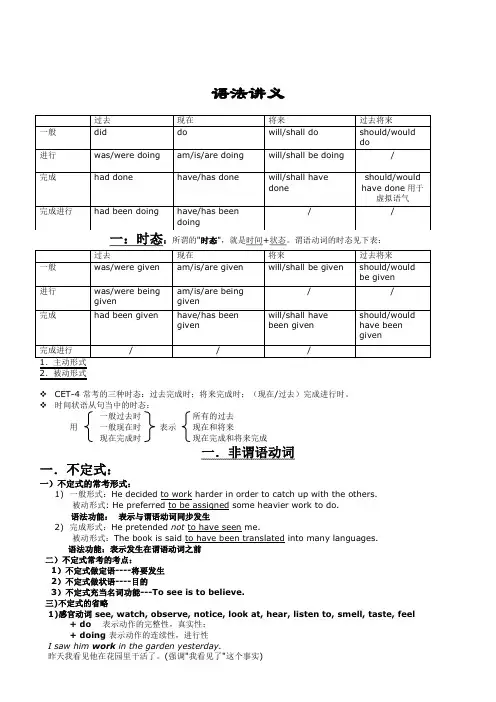
语法讲义一:时态:所谓的"时态",就是时间+状态。
谓语动词的时态见下表:1.主动形式2.被动形式CET-4 常考的三种时态:过去完成时;将来完成时;(现在/过去)完成进行时。
时间状语从句当中的时态:一般过去时所有的过去用一般现在时表示现在和将来现在完成时现在完成和将来完成一.非谓语动词一.不定式:一)不定式的常考形式:1)一般形式:He decided to work harder in order to catch up with the others.被动形式: He preferred to be assigned some heavier work to do.语法功能:表示与谓语动词同步发生2)完成形式:He pretended not to have seen me.被动形式:The book is said to have been translated into many languages.语法功能:表示发生在谓语动词之前二)不定式常考的考点:1)不定式做定语----将要发生2)不定式做状语----目的3)不定式充当名词功能---To see is to believe.三)不定式的省略1)感官动词 see, watch, observe, notice, look at, hear, listen to, smell, taste, feel+ do表示动作的完整性,真实性;+ doing表示动作的连续性,进行性I saw him work in the garden yesterday.昨天我看见他在花园里干活了。
(强调"我看见了"这个事实)I saw him working in the garden yesterday.昨天我见他正在花园里干活。
(强调"我见他正干活"这个动作)感官动词后面接形容词而不是副词:The cake tastes good; It feels comfortable.2) 使役动词 have bid make let 等词后不定式要省略但同1)一样被动以后要还原toI ‘d like to have John do it.I have my package weighed.Paul doesn’t have to be made to learn.3) help help sb do help sb to do help do help to do四)有些动词后只跟不定式如:want,wish,hope,manage,promise,refuse,pretend,plan, offer,decide,agree,expect allow sb to do, cause sb to do , permit sb to do, enable sb to doforce sb to do. be more likely to do love to do warn sb to do be able to dobe ambitious to do. begin to do . start to do五) 有的时候to后面要接-ing形式accustom (oneself) to; be accustomed to; face up to; in addition to; look forward to; object to; be reduced to; resign oneself to; be resigned to; resort to; sink to; be used to; be alternative to; be close/closeness to; be dedication/dedicated to; be opposition/opposed to; be similarity/similar to.三、need/want 后的-ing形式具有被动的意思。
一、前言随着大学学习的深入,语法知识在我的知识体系中占据了越来越重要的地位。
在过去的几年里,我通过课堂学习、自学和实践活动,对语法有了更全面、更深入的理解。
本报告旨在总结我在大学期间语法学习的收获与不足,并提出相应的改进措施。
二、语法学习收获1. 基础知识扎实:在大学期间,我系统学习了英语语法的基础知识,包括名词、动词、形容词、副词、介词、连词等词类的用法,以及时态、语态、非谓语动词等语法现象。
这些基础知识为我后续的英语学习和应用打下了坚实的基础。
2. 语法运用能力提高:通过大量的练习和实际应用,我在语法运用方面取得了显著进步。
我能够熟练运用各种语法知识进行写作和口语表达,提高了我的英语交际能力。
3. 对语法有了更深的理解:在大学期间,我对语法有了更深入的理解。
我认识到,语法不仅是语言的基础,也是语言运用的关键。
只有掌握了正确的语法知识,才能使语言表达更加准确、流畅。
三、语法学习不足1. 语法知识运用不够灵活:虽然我对语法知识有了扎实的掌握,但在实际运用中,我仍然存在语法知识运用不够灵活的问题。
例如,在写作和口语表达中,有时会出现语法错误或表达不够地道的情况。
2. 语法学习缺乏系统性:在大学期间,我的语法学习主要依赖于课堂和教材,缺乏系统性。
这导致我在某些语法知识点上的理解不够深入,影响了我的语法运用能力。
3. 对语法知识的重视程度不足:在大学期间,我对语法知识的重视程度不足,认为语法只是语言的基础,没有必要过分关注。
这种观念导致我在语法学习上投入的时间和精力不够,影响了我的学习效果。
四、改进措施1. 加强语法知识的应用练习:为了提高语法运用能力,我将加强语法知识的应用练习,通过大量的写作和口语练习,使语法知识更加熟练。
2. 制定系统性的语法学习计划:我将制定一个系统性的语法学习计划,对语法知识进行深入学习和复习,确保每个知识点都得到充分掌握。
3. 提高对语法知识的重视程度:我将改变对语法知识的认识,认识到语法知识对于语言学习和应用的重要性,并投入更多的时间和精力进行学习。
大学英语祈使句语法总结第1篇(1)let us do sth.让(或允许)我们做某事;即提出请求,请对方允许,而对方不做,只有我们做。
附加疑问句用will you? 如:Let us have a rest, will you? 让我们休息一下,好吗?(2)let’s do sth.咱们去做某事吧;即提出建议,劝诱对方一同做某事,附加疑问句用shall we?如:Let’s go for a picnic, shall we? 咱们去野餐吧,好吗?总结祈使句的用法大学英语祈使句语法总结第2篇1. It is quite a nice present.→_____ _____ nice present!2. We have fine weather today.→ _____ _____ weather we have today!3. It’s sunny today.→_____ _____ sunny day it is today!4. The children are working hard.→ _____ _____ the children are working!5. She played basketball wonderfully.→ _____ _____ she played basketball!6. He is good at singing.→_____ _____ he sings!7. He was doing well in dancing.→ _____ a _____ dancer he was!8. Tom coughs badly.→_____ _____ _____ cough Tom has!9. The fish is v ery lovely.→_____ _____ the fish is!10. They live a happy life today.→ _____ _____ _____ life they live!大学英语祈使句语法总结第3篇1. If you are tired, ______ a rest.A. haveB. havingC. to haveD. had2. ______ me go. It is very important for me.A. Do letB. let doC. Doing letD. To do let3. He is not honest. ______ believe him.A. NotB. Don’tC. To notD. Not to4. If you want to stay, let me know, ______?A. will youB. shall weC. do youD. do we5. Never come late again, ______?A. will youB. won’tC. do youD. does he6. _____ up early tomorrow, or you can’t catch the train.A. GettingB. GetC. To getD. Got7. _____ in the street. It’s dangerous.A. Not playB. Not to playC. Don’t playD. Don’t to play8. Please ______ me some money, will you?A. lendB. lendingC. to lendD. be lend9. The film is about to begin. Please ______ seated.A. beB. areC. isD. being10. _____ the boxes. You may use them later.A. KeepB. KeepingC. To keepD. Kept大学英语祈使句语法总结第4篇11. Would you like to wait a moment?→_____ _____ a moment.12. Can I use your bike?→Please _____ _____ your bike.13. You’d better not smoke here.→_____ _____ here.14. You must be careful with your handwriting. _____ _____ with your handwriting.15. Will you please not play with my pencil? →____ ____ with my pencil,____.。
大学英语语法重点归纳总结在学习英语过程中,语法一直是学生们较为困惑的一部分,也是需要掌握的重要基础知识。
本文将对大学英语语法的重点进行归纳总结,帮助读者更好地掌握英语语法知识。
一. 词类及其基本特点1. 名词(Noun)- 名词可以指示人、事物、地点、抽象概念等。
- 大多数名词可以用单数形式和复数形式。
- 名词可以有不同的格(主格、宾格、所有格)表示不同的功能。
2. 代词(Pronoun)- 代词用来代替名词,避免重复。
- 代词有人称、物主、指示、疑问、反身等不同形式。
3. 动词(Verb)- 动词表示行为、状态或事件的发生。
- 动词可以有不同的时态(现在时、过去时、未来时等)、语态(主动语态、被动语态)和语气(陈述语气、命令语气、疑问语气等)。
4. 形容词(Adjective)- 形容词用来修饰名词或代词,描述其性质或状态。
- 形容词可以有不同的级别(原级、比较级、最高级)表示程度的差异。
5. 副词(Adverb)- 副词主要用来修饰动词、形容词或其他副词,表示时间、地点、方式、程度等。
- 副词可以有不同的级别(原级、比较级、最高级)表示程度的差异。
6. 介词(Preposition)- 介词与其他词组合,表示时间、地点、方向等概念。
- 介词通常与名词或代词搭配使用,构成介词短语。
7. 连词(Conjunction)- 连词用来连接词语、短语或句子,起到衔接、承接或对比的作用。
- 连词可以分为并列连词、从属连词和关联连词等。
8. 冠词(Article)- 冠词用于限定名词,包括定冠词(the)和不定冠词(a/an)。
二. 句子结构及语序1. 主谓结构- 英语句子通常采用主谓结构,即主语+谓语动词。
2. 主谓宾结构- 在主谓结构的基础上,加入宾语,形成主谓宾结构。
3. 主谓表结构- 在主谓结构的基础上,加入表语(形容词、名词等),形成主谓表结构。
4. 主谓双宾结构- 在主谓宾结构的基础上,加入间接宾语,形成主谓双宾结构。
大学英专生期末语法总结一、名词名词是指人、事、物、地方、抽象概念等的名称,主要有以下几种形式:1. 可数名词与不可数名词:可数名词可以用于单数和复数形式,有特指与泛指之分。
不可数名词则只有单数形式,不能用于复数。
2. 特殊名词:特殊名词是指具有特殊形式以及不同的复数形式的名词,如man-men,woman-women等。
3. 复合名词:由两个或多个单词构成的名词,可以由连字符、空格或没任何连接符号表示,如high school, watermelon等。
4. 特定名词的大小写:人名、地名、品牌名等专有名词的首字母需要大写。
二、代词代词是用来代替一个或多个名词的词语,可以分为人称代词、物主代词、反身代词、相互代词、指示代词、疑问代词和不定代词等。
1. 人称代词:人称代词用来代替人,包括主格代词、宾格代词以及物主代词。
2. 反身代词:反身代词是指动作的执行者和受事者是同一个人,包括myself、yourself、himself等。
3. 指示代词:指示代词用来指示所代表的对象,包括this、that、these、those等。
4. 疑问代词:疑问代词用来提问,包括what、which、who、whom等。
5. 不定代词:不定代词用来指代不确定或不具体的人或事物,包括some、any、no、none、every、all 等。
三、动词动词用来表示动作、状态或存在,可以分为及物动词、不及物动词、行为动词、状语动词、系动词等。
1. 及物动词:及物动词需要带宾语才能构成完整的句子,如eat、drink等。
2. 不及物动词:不及物动词本身构成完整的句子,不需要宾语,如sleep、run等。
3. 行为动词:行为动词表示人或物的具体行为,如walk、talk等。
4. 状语动词:状语动词用来修饰谓语动词或整个句子,如can、may等。
5. 系动词:系动词用来连接主语和表语,如be、seem等。
四、形容词和副词形容词用来修饰名词或代词,描述它们的性质或状态,如beautiful、red等。
大学英语语法汇总一、名词(一)以S结尾得名词做主语得主谓一致1、以s结尾得疾病与游戏arthritis,bronchitis,rickets,measles,mumps,diabetes,darts,marbles做主语时谓语动词应使用单数形式。
例:Arthritis causes pain in the joints、特殊情况:有一些疾病/游戏名词作谓语动词可单可复:measles,rickets Cards做主语动词用复数;darts,marbles指游戏使用得具体得镖与弹子意义时,谓语动词marbles可单可复,darts用复数形式。
例:Measles always cccur/occurs among kids、Nine darts are thrown at each turn、2、以s结尾得学科名称physics,mathematics,optics,acoustics,politics,athletics,tactics,lingu istics,etc做主语时谓语动词使用单数。
例:Mathematics is always a headache for girls、Politics always attracts boys、特殊情况:如果这些词并不就是只带“学科”等意义,谓语动词便可做复数使用。
例如,mathematics运算能力,athletic体育运动,acoustics音响效果,tactics 策略,economics经济学意义。
例:The acoustics in Bon Jovi’s Tulsa concert were beyond criticism last spring、3、以s结尾得地理名称The States,the united states,the Netherlands,the Philippines,the United Arab Emirates,the United Nation做主语时,谓语动词使用单数。
大学四级语法讲义一:时态:所谓的"时态",就是时间+状态。
谓语动词的时态见下表:1.主动形式2.被动形式❖时间状语从句当中的时态:一般过去时所有的过去用一般现在时表示现在和将来现在完成时现在完成和将来完成一.非谓语动词一.不定式:一)不定式的常考形式:1)一般形式:He decided to work harder in order to catch up with the others.被动形式: He preferred to be assigned some heavier work to do.语法功能:表示与谓语动词同步发生2)完成形式:He pretended not to have seen me.被动形式:The book is said to have been translated into many languages.语法功能:表示发生在谓语动词之前二)不定式常考的考点:1)不定式做定语----将要发生2)不定式做状语----目的3)不定式充当名词功能---To see is to believe.三)不定式的省略1)感官动词 see, watch, observe, notice, look at, hear, listen to, smell, taste, feel+ do表示动作的完整性,真实性;+ doing表示动作的连续性,进行性I saw him work in the garden yesterday.昨天我看见他在花园里干活了。
(强调"我看见了"这个事实)I saw him working in the garden yesterday.昨天我见他正在花园里干活。
(强调"我见他正干活"这个动作)❖感官动词后面接形容词而不是副词:The cake tastes good; It feels comfortable.2) 使役动词 have bid make let 等词后不定式要省略但同1)一样被动以后要还原toI ‘d like to have John do it.I have my package weighed.Paul doesn’t have to be mad e to learn.3) help help sb do help sb to do help do help to do四)有些动词后只跟不定式如:want,wish,hope,manage,promise,refuse,pretend,plan, offer,decide,agree,expect allow sb to do, cause sb to do , permit sb to do, enable sb to doforce sb to do. be more likely to do love to do warn sb to do be able to dobe ambitious to do. begin to do . start to do五) 有的时候to后面要接-ing形式accustom (oneself) to; be accustomed to; face up to; in addition to; look forward to; object to; be reduced to; resign oneself to; be resigned to; resort to; sink to; be used to; be alternative to; be close/closeness to; be dedication/dedicated to; be opposition/opposed to; besimilarity/similar to.三、need/want 后的-ing形式具有被动的意思。
一、大学英语三、四级语法归纳二、时态和语态I、时态◇时态是表示动作发生的时间和表现方式的一种动词形式。
每一种“时间+方式”就构成一种时态。
从时间上看,有现在、过去、将来和过去将来之分,从动作上看,有一般、进行、完成及完成进行之区别。
(英语动词有16种时态)在实际应用中以及TOEFL等考试中出现最多的时态也只有4种,即一般现在时,现在完成时,一般过去时及过去完成时。
◇1.用一般现在时表示将来的动作。
B.在由连词even if, unless, as soon as, if, when, in case, before, after, until, once, themoment, as long as等引出状语从句中,谓语一般不用will或shall来表示将来的动作,仅用一般现在时。
例如:C.eg. She will come to see you the moment she finishes her work.◇The boss won’t give the workers pay unless they ______their work today.(03/12, 43)D.A) finish B) finished C) will finish D) had finished◇Such crimes may be so complex that months or years go by before anyone__________ them.E.A) discovered B) will discover (03/1,31, CET-4)F.C) would have discovered D) discoversG. B. 某些表示起始的动词,可用一般现在时表示按预定计划或时刻表在短时间内将发生的动作。
这类动词有:be, go, come, start, leave, depart, arrive, begin, return等。
例如:◇The train leaves at five sharp.H. 2. 现在完成时、过去完成时以及将来完成时之间的区别1)现在完成时:I.①构成:have/has + 过去分词J.②语法意义及要点:A.表示一个过去开始的状态或动作持续到现在并可能继续持续下去,常同表示一段时间的状语连用。
eg. so far,up to now,since,for a long time etc.K.eg. He has worked as a teacher for many yearsL.Up till now,nothing has gone wrong.◇Don’t disturb Father. He ________ letters all morning and has written ten so far. (99/6, 42)M.A) write B) has been writing C) has written D) was writingN.◇This is the worst time of the year. It ________every day so far.(02/6, 42)O.A) is raining B) has rained C) rained D) rainsP.B.表示一个过去发生的对现在仍有影响的动作或事件。
常与不确定的过去时间状语连用(eg. yet,just,before,recently, etc.);也同表示频度时间状语连用(eg. often,ever,never,sometimes,several times, etc).;还可同包括现在时间在内的时间状语连用(eg.now,today,this morning, etc). 但不能同特定的过去时间状语连用(last year,inl997 etc.)Q.eg. I have never learned Japanese before.R.We have been quite busy lately /recently.S.◇I am meeting Ivan tonight; I _______a Russian before.(01/1,49)T.A) didn’t ever meet B) have ever met C) had never met D) have never metU.C.在时间或条件状语从句中,当表示将来完成时的意义时,要用现在完成时来代替将来完成时。
◇We'll start at 5 0'clock if it has stopped raining by then.◇I shall go to see you when I have finished my homework.V.Note:行为不能持续的瞬间动词(Instantaneous Verb),eg. arrive, begin, come, go,start, leave, die,join,etc. 通常不能用于这一语法意义,即该类动词在现完成时中不能与表示一段时间的状语连用。
◇He has joined the army for five years.(F)◇He has been in the army for five years。
(T)W.2) 过去完成时:X.①构成:had+过去分词Y.②语法意义及要点:表示某一动作或情况发生在过去某一时刻之前并持续到该时刻。
Z.eg. David and Jenny had known each other for a long time before their marriage. AA.T hey had got everything ready before the party began.◇The burglary ______before I arrived at the office; all I could do was to call the police. (03/6, 56)BB.A) has occurred B) had occurred C) was occurring D) would occurCC.N ote: 与现在完成时不同的是过去完成时可以与表示具体过去的时间状语连用。
◇He said that he had seen her the day before yesterday.DD.3) 将来完成时:EE.①构成:shall/will +have+过去分词FF.②语法意义及要点:表示某一动作在将来某一时刻或将来某一动作之前已经完成或发生。
GG.eg. He will have graduated from high school before his next birthday,HH.The shop will have closed already before you get there.II.◇By the end of next year they _________together for twenty years. (01/1,48) JJ.A) will have worked B) had worked C) would work D) have workedKK.◇--"May I speak to your manager Mr. Williams at five o'clock tonight?"(00/6,41, CET-4)--"I'm sorry. Mr. Williams _______ to a conference long before then."A) will have gone B) had gone C) would have gone D) has goneLL.◇By the time he arrives in Beijing, we_______ here for two days. (01/6,31, CET-4)A) have been staying B) have stayed C) shall stay D) will havestayedMM.◇By the time you get to New York, I _______for London. (02/1,41, CET-4)A) would be leaving B) am leaving C) have already left D) shall haveleftNN.4) 将来时间表示法:OO.①be going to +V. 表示不太明确的意图、打算。
◇We’re going to to build a new highway to the east.PP.②be + to + V. 表示正式的安排、指示、命令、禁止等。
例如:QQ.You’re to do your homework before you watch TV.◇You’re not to tell him anything about our plans.RR.③be about to / be on the point of 表示不久的将来,后者表示更近的将来,强调将来要发生的事情已临近。
例如:◇I feel that something terrible is about to happen.◇I can’t see you now. I’m on the point of leaving.SS.④be due to 表示将来的用法与时刻表、实施计划有关。
例如:◇The train to Hangzhou is due to arrive at 13:15.II、语态TT.英语动词有两种语态,一种叫主动语态(Active Voice),一种叫被动语态(Passive Voice), 分别表示主语和谓语动词的主动关系和被动关系。
.主动语态用于主动句,表示主语是动作的执行者;被动语态用于被动句,表示主语是动作的承受者。
UU.☆基本公式是:“是”动词+过去分词(被动语态有13种)VV.1. am/ is / are +P.P 2. am/ is / are +being +P.PWW. 3. was/ were +P.P 4. was/ were +being +P.PXX.5. has been + P.P 6. had + been + P.PYY.7. shall / will be + P.P 8. should / would be + P.PZZ.9. should / shall / would / must / need / may / might / ought toAAA./ can / could / will be+ P.P (情态动词)BBB.10. be +to be + P.P (不定式) 11. to have been + P.P (完成体)CCC.12 .being + P.P (动名词及分词) 13. having been +PP(完成时动名词及分词)☆动词不定式符号to的处理。